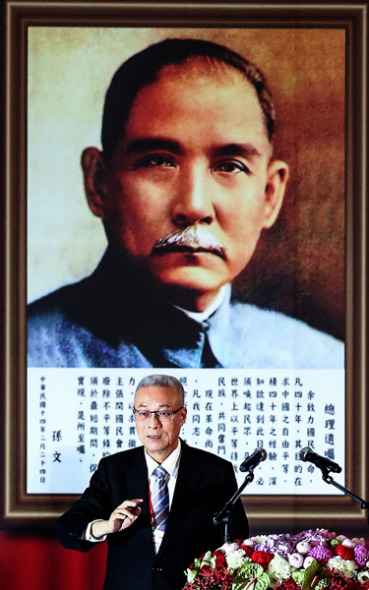
New Kuomintang Chairman Wu Den-yih gives his inauguration speech in front of the photo of Sun Yat-sen, the founding father of the Kuomintang, and Sun's will, on Sunday in Taichung, Taiwan, where the party's 20th plenary congress was held the same day. (Photo by Deng Boren/China Daily)
The new chairman of Taiwan-based Kuomintang acknowledged the one-China policy and firmly opposed "Taiwan independence" on his inauguration ceremony and the party's 20th plenary congress on Sunday in Taichung.
"Upholding the foundation of the 1992 Consensus, we will firmly oppose 'Taiwan independence' and carry forward Chinese culture, promote mutual respect and tolerance and maintain dialogue through economy, culture and the peace forum," Chairman Wu Den-yih said in his inauguration speech.
The Kuomintang will also work to improve understanding between the two sides, explore peaceful cross-Strait prospects, ensure peace and stability in the region and safeguard the well-being of the people of Taiwan, he said.
Wu was elected KMT chairman on May 20 with 52 percent of the vote.
The meeting on Sunday also approved a new party platform that pledged to oppose "Taiwan independence".
The KMT will follow the "common aspirations and prospects of cross-Strait peace and development" issued in 2005 by leaders of the Communist Party of China and the KMT as well as the basic principles practiced during the administration of Taiwan's former leader Ma Ying-jeou.
The party will also push forward all activities conducive to peaceful and stable development of cross-Strait ties, it said.
"Cross-Straits relations are challenging and complicated. Under the common political foundation of upholding the 1992 Consensus, which refers to the one-China policy and opposes 'Taiwan independence', we are willing to stay in communication and enhance dialogue with the KMT to maintain peaceful development of cross-Strait relations," said An Fengshan, spokesman for the Taiwan Affairs Office of the State Council, China's Cabinet.
"It is time to have confidence in cross-Straits relations," said Liu Guoshen, a professor of Taiwan studies at Xiamen University.
He praised the Kuomintang's acknowledgment of the 1992 Consensus, the one-China principle.
However, he said that the Kuomintang, as a non-ruling party, does not have much say in cross-Straits economic and commercial exchanges.
"Communication between the mainland and the island is insufficient. More communication channels are welcomed," he said.
Since the Democratic Progressive Party took office in May 2016, it has refused to acknowledge the 1992 Consensus, and official channels of cross-Strait communication have been suspended.
Taiwan leader Tsai Ing-wen's reluctance to acknowledge the 1992 Consensus "has damaged all the hard work toward peaceful relations across the Taiwan Straits", Ma Xiaoguang, another spokesman for the Taiwan Affairs Office of the State Council, has previously said.
Over the past year, the number of mainland tourists visiting Taiwan has sharply declined.


















































